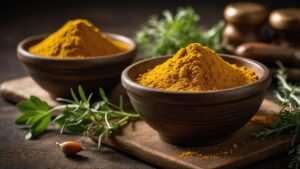Anxiety and fatigue have become nearly universal experiences in today’s fast-paced, high-stress world. Many people seek relief in pharmaceuticals, but an increasing number are turning to natural solutions like Rhodiola and Holy Basil. These two adaptogens have gained widespread recognition for their ability to support the body in managing stress, boosting energy, and restoring balance without the side effects often associated with medications. By understanding their unique properties, mechanisms, and benefits, we can harness these ancient remedies to promote mental and physical well-being. In this article, we will delve deeply into how Rhodiola and Holy Basil work as effective adaptogens for anxiety and fatigue, their science-backed benefits, and practical ways to incorporate them into daily life.
Understanding Adaptogens and Their Role in Health
Adaptogens are natural substances that help the body adapt to stress, regulate hormonal responses, and improve resilience. These herbs have been used for centuries in traditional medicine systems like Ayurveda and Traditional Chinese Medicine, but modern science is beginning to uncover their mechanisms. Adaptogens work by interacting with the hypothalamic-pituitary-adrenal (HPA) axis and the body’s stress-response systems. This interaction helps reduce the harmful effects of chronic stress, including fatigue, weakened immunity, and mental burnout.
Rhodiola rosea and Holy Basil (Ocimum sanctum), also known as Tulsi, are two of the most studied adaptogens. While both herbs are known for their stress-relieving properties, they have unique attributes that make them especially effective for combating anxiety and fatigue. Let’s explore their individual benefits and how they compare.
Rhodiola Rosea: The Arctic Root for Resilience
Origins and Historical Use
Rhodiola rosea, also known as “golden root” or “Arctic root,” is a perennial plant native to the cold regions of Europe, Asia, and North America. For centuries, it has been used in Siberian and Scandinavian traditional medicine to enhance physical endurance, mental clarity, and resistance to stress. Viking warriors are said to have relied on Rhodiola to improve their strength and stamina during expeditions.
Scientific Benefits for Anxiety and Fatigue
Modern research supports Rhodiola’s traditional use, particularly in addressing anxiety and fatigue. Studies suggest that Rhodiola works as an adaptogen by modulating cortisol levels, the hormone responsible for the body’s fight-or-flight response. Elevated cortisol levels over time can lead to chronic fatigue and anxiety disorders. Rhodiola helps balance cortisol, reducing stress-related symptoms.
- Reduces Fatigue: Clinical trials have demonstrated that Rhodiola supplementation improves energy levels and reduces physical and mental fatigue. A 2017 study published in Phytomedicine showed that participants who took Rhodiola experienced significant improvements in energy, focus, and overall well-being compared to a placebo group.
- Eases Anxiety: Rhodiola has anxiolytic properties, meaning it can help reduce anxiety without the sedative effects of traditional medications. It increases the brain’s levels of serotonin and dopamine, neurotransmitters linked to mood stabilization and pleasure.
- Enhances Cognitive Function: By combating oxidative stress and inflammation in the brain, Rhodiola has been shown to improve memory, concentration, and problem-solving abilities. This makes it an excellent choice for those experiencing stress-related brain fog or difficulty focusing.
Practical Applications
Rhodiola is available in various forms, including capsules, teas, and tinctures. The most effective dose varies depending on individual needs, but a common recommendation is 200–400 mg per day, standardized to contain 3% rosavins and 1% salidrosides, the active compounds.
Holy Basil (Tulsi): The Queen of Herbs
Origins and Historical Use
Holy Basil, or Tulsi, has been revered in Indian Ayurvedic medicine for over 3,000 years. Known as the “Queen of Herbs,” Tulsi is considered a sacred plant with profound spiritual and medicinal significance. It is often used in rituals, teas, and tonics for its calming and rejuvenating properties.
Scientific Benefits for Anxiety and Fatigue
Holy Basil’s adaptogenic effects stem from its ability to regulate stress hormones, improve immunity, and promote a sense of calm. Its phytochemical compounds, including eugenol, ursolic acid, and rosmarinic acid, play a key role in its therapeutic properties.
- Calms Anxiety: Tulsi’s calming effects are well-documented in scientific literature. A 2014 study published in the Journal of Ayurveda and Integrative Medicine found that participants who consumed Holy Basil experienced a significant reduction in generalized anxiety symptoms.
- Boosts Energy and Endurance: Holy Basil supports adrenal function, which is essential for maintaining energy levels. By reducing the impact of chronic stress, it helps combat adrenal fatigue, a common condition in those who feel persistently tired despite adequate rest.
- Supports Immunity: Stress and fatigue often weaken the immune system, leaving individuals vulnerable to infections. Tulsi’s antimicrobial and anti-inflammatory properties make it a powerful ally in restoring immune health.
- Improves Sleep Quality: Tulsi promotes better sleep by calming the nervous system and reducing stress-induced insomnia. This restorative sleep further enhances energy and reduces fatigue.
Practical Applications
Holy Basil is commonly consumed as a tea or in capsule form. A daily cup of Tulsi tea can be a soothing ritual, while capsules standardized to contain at least 2% ursolic acid are effective for targeted support.
Comparing Rhodiola and Holy Basil
While both Rhodiola and Holy Basil are adaptogens with overlapping benefits, their unique properties make them suited to different needs:
- Energy vs. Calm: Rhodiola is particularly effective for boosting physical and mental energy, making it ideal for those with fatigue-related productivity issues. Holy Basil, on the other hand, is better suited for those seeking to reduce anxiety and promote a sense of calm.
- Cognitive Focus: Rhodiola’s impact on neurotransmitters like dopamine and serotonin gives it an edge in improving cognitive function under stress.
- Immune Support: Holy Basil excels in enhancing immune function, especially for those dealing with stress-related illnesses.
Incorporating Rhodiola and Holy Basil into Your Routine

Adding Rhodiola and Holy Basil to your daily routine doesn’t require an overhaul of your lifestyle. Start with small doses and gradually increase based on your body’s response. For best results, pair these adaptogens with a balanced diet, regular exercise, and stress-management techniques like mindfulness or yoga.
- Morning Routine: Begin your day with Rhodiola to improve focus and energy levels. A capsule or tea can help set a productive tone for the day.
- Evening Wind-Down: Holy Basil tea is perfect for unwinding before bed, helping you transition into restorative sleep.
- Combined Use: Some people may benefit from using both adaptogens at different times of the day. For example, Rhodiola in the morning for energy and Holy Basil in the evening for relaxation.
Conclusion
Rhodiola and Holy Basil are two extraordinary adaptogens that offer a natural and effective solution to anxiety and fatigue. These powerful herbs work by supporting the body’s stress response, enhancing resilience, and promoting mental and physical balance. While Rhodiola energizes and sharpens focus, Holy Basil calms and nurtures the mind and body. Their complementary properties make them a dynamic duo in the quest for holistic health.
As more people seek alternatives to pharmaceuticals, the science and tradition behind adaptogens like Rhodiola and Holy Basil continue to validate their efficacy. By incorporating these herbs into your wellness routine, you can take a proactive approach to managing stress, improving energy levels, and fostering long-term well-being. Explore their benefits, experiment with their uses, and experience how these ancient remedies can transform your health naturally.








